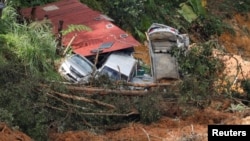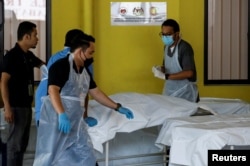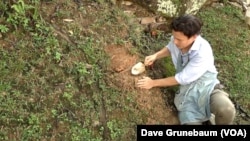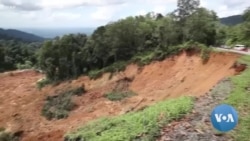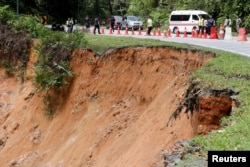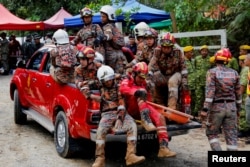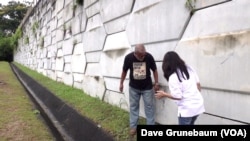Officials in Malaysia are nearing the end of an investigation into the cause of a deadly overnight landslide that struck a farm and campsite in December, amid questions as to whether the government allowed development in an area unsuitable for these types of activities.
The disaster left 31 people dead at Father’s Organic Farm in the rural community of Batang Kali in Selangor state. Authorities are looking into why the campsite and farm were developed below a steep slope that is downhill from a road cut into the slope decades earlier.
Teckwyn Lim is a geographer and honorary associate professor at the University of Nottingham Malaysia. Lim has been analyzing recent as well as decades-old satellite images of the site and says he has discovered some clues.
Lim says in order to prevent a landslide from falling onto the road, much of the soil on the hillside above it was removed to make the hill less steep. Lim says the soil that was taken from above the road was placed below it, then packed and terraced.
“Eventually this fill material became waterlogged and collapsed, causing the landslide that fell onto the campsite and farm below which were developed many years after the road was built,” Lim said.
Lim questions why this campsite and farm were developed in this location. “It’s not an appropriate place to do any kind of development,” Lim said, adding that the land uphill from the campsite and farm is “very steep; it’s fragile terrain.”
In a written statement, the Ministry of Natural Resources, Environment and Climate Change told VOA the Selangor State Environment Department approved an environmental impact assessment report in 2013 for a proposed development by Malaysia Botanical Gardens Resort. But the ministry said the nearby area on which Father’s Organic Farm sits is a “no-go area.”
At a news conference, VOA asked Natural Resources, Environment and Climate Change Minister Nik Nazmi Nik Ahmad to clarify whether victims were sleeping in an area where there was not supposed to be any farming, business or camping activity. Nik Nazmi said initial reports “seem to suggest so,” but added that he needs to wait for the investigation to be complete before making final comments.
The minister said he expects his ministry’s investigation to be completed by the end of this month. VOA has asked the ministry repeatedly for the environmental impact assessment report but, so far, has not received it. The government has also not answered questions from VOA regarding the ownership of the land on which Father’s Organic Farms sits or on its connection to Malaysia Botanical Gardens Resort.
Several days after the landslide, a member of the Selangor state executive council, Ng Sze Han, said Father’s had a permit to operate as an organic farm.
“Did the government allow a farm in a place that’s a no-go area?” Teckwyn Lim, the geographer, asked. “We need to find out if someone or some agency wasn’t doing their job.”
Batang Kali, where the farm is located, is one of three towns in Hulu Selangor District. VOA has made multiple requests to interview the operators of Father’s Organic Farm as well as separate requests to Hulu Selangor Municipal Council president Mohd Hasry Nor Mohd but has not received responses from them.
Malaysia has a history of fatal landslides. In 1993, 48 people were killed when the Highland Towers apartment block collapsed in a landslide in Selangor. In 1995, 20 people were killed when a landslide sent vehicles into a ravine. And in 1996, 44 people were killed after a mudflow struck their rural village.
“Malaysia is a landslide-prone country. The reason being we have a lot of rainfall plus we also have a lot of steep, hilly terrain,” said Hassandi Abdullah, a geotechnical engineer and member of SlopeWatch, a volunteer group with almost 2,000 members across Malaysia. They live in communities with steep slopes and regularly inspect slope drains, retaining walls and other infrastructure set up to prevent future disasters.
“What we want communities to do is to monitor and watch out for signs of landslides,” said SlopeWatch program director Eriko Motoyama. “The other one,” she said, “is to report to the authorities and number three is to engage in maintenance, maintain your slopes.”




